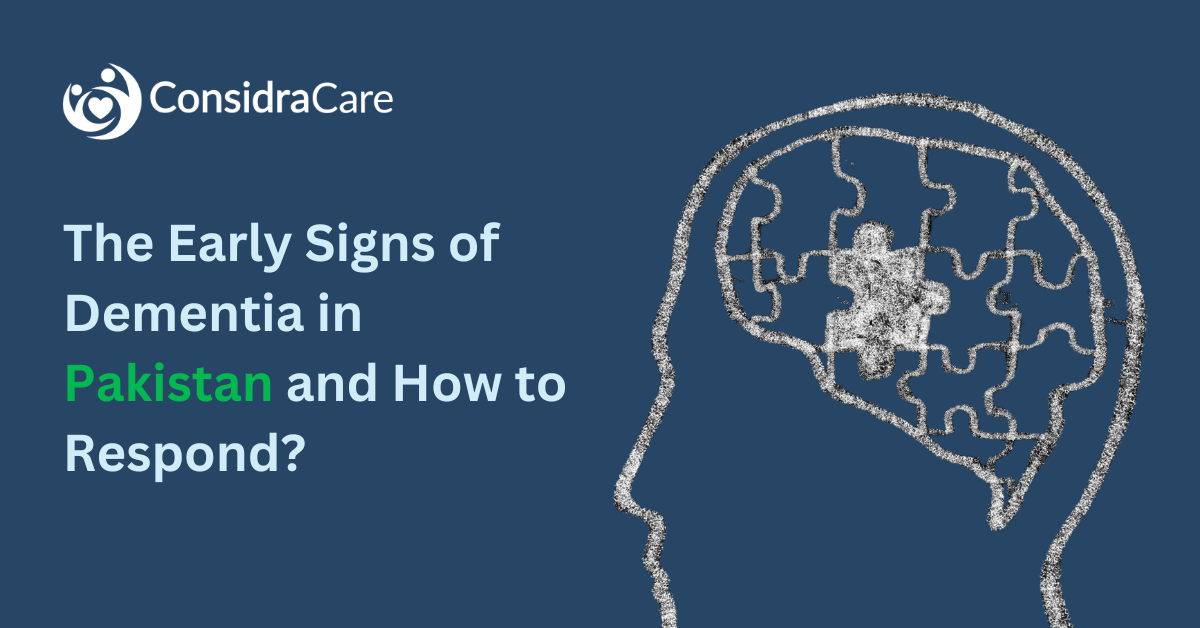Dementia is a neurological condition that affects millions of individuals around the world. According to the World Health Organization, over 55 million people worldwide are diagnosed with dementia, and over 10 million new cases are identified every year. In this article, we will shed light on the prevalence of dementia in Pakistan, the challenges faced by individuals with dementia and their families, the early signs of dementia, and the appropriate response to them.
What is Dementia?
Before we delve into the main topic, let’s first understand what Dementia is. Dementia is not a specific disease, rather it is a term used to describe a group of conditions that are characterized by a decline in cognitive function and memory loss. Alzheimer’s disease is the most common form of dementia, accounting for around 60-70% of cases. It affects the brain by causing a progressive deterioration of nerve cells, which leads to a decline in an individual’s memory, thinking, and reasoning abilities.
Early Signs of Dementia in Pakistan:
Dementia is becoming a growing concern in Pakistan. According to the Global Age Watch Index, Pakistan ranks extremely low at 92 out of 94 countries, which means that the circumstances of older people in Pakistan, including health, income, employment, and social connectedness, are not favorable. So, It is crucial to recognize the early signs of dementia so that people can receive timely diagnosis and care. Here are some key signs to watch out for:
1. Memory Loss:
One of the most common early signs of dementia is memory loss. A person with this type of memory loss may forget important dates or events, misplace items, or ask repetitive questions. If you notice that your loved one is having trouble remembering things that they used to recall easily, it may be a sign of dementia.
2. Difficulty with Language:
Another early sign of dementia is difficulty with language. This can include trouble finding the right words, repeating the same phrases, or struggling to follow a conversation. People with dementia may also have trouble writing or reading.
3. Changes in Mood and Personality:
Dementia can also cause changes in mood and personality. People may become apathetic, irritable, depressed, or paranoid. They may lose interest in hobbies or activities they once enjoyed. If you notice significant changes in your loved one’s mood or behavior, it may be a sign of dementia.
4. Difficulty with Activities of Daily Living:
As dementia progresses, people may have trouble with basic activities of daily living, such as bathing, dressing, or feeding themselves. They may also become disoriented or lost in familiar places. If you notice your loved one struggling with these tasks, it may be time to seek medical help.
Are you concerned about the quality of healthcare for your elderly family members in Pakistan? Look no further than ConsidraCare Pakistan! Our senior home care services provide personalized attention to ensure your loved ones receive the highest level of care. Take a step towards peace of mind by contacting us today.
How to Respond to Early Signs of Dementia:
It’s crucial to recognize early signs of dementia in order to obtain a timely diagnosis and appropriate care. Here are some actionable steps you or your loved ones can take if early signs of dementia are observed.
1. Seek Medical Evaluation:
If you or a loved one is exhibiting signs of dementia, it’s essential to seek medical evaluation promptly. Schedule an appointment with a medical professional experienced in diagnosing and treating dementia.
2. Establish a Support Network:
Establishing a support network is crucial during this challenging time. Reach out to family, friends, or support groups specializing in dementia care. They can provide emotional support, share experiences, offer guidance, and connect you to additional resources.
3. Stay Engaged and Maintain Social Connections:
Social interactions are crucial for individuals with dementia. Encourage and support social engagement to maintain cognitive abilities and emotional well-being. These connections can provide a sense of belonging and reduce feelings of isolation.
Conclusion:
Dementia is a pressing issue in Pakistan, requiring increased awareness and support. Recognizing the early signs of dementia is crucial for timely diagnosis and care. Memory loss, difficulty with language, and changes in mood are key indicators to look out for. Seeking medical evaluation, establishing a support network, and promoting social engagement are essential steps to address dementia effectively.



